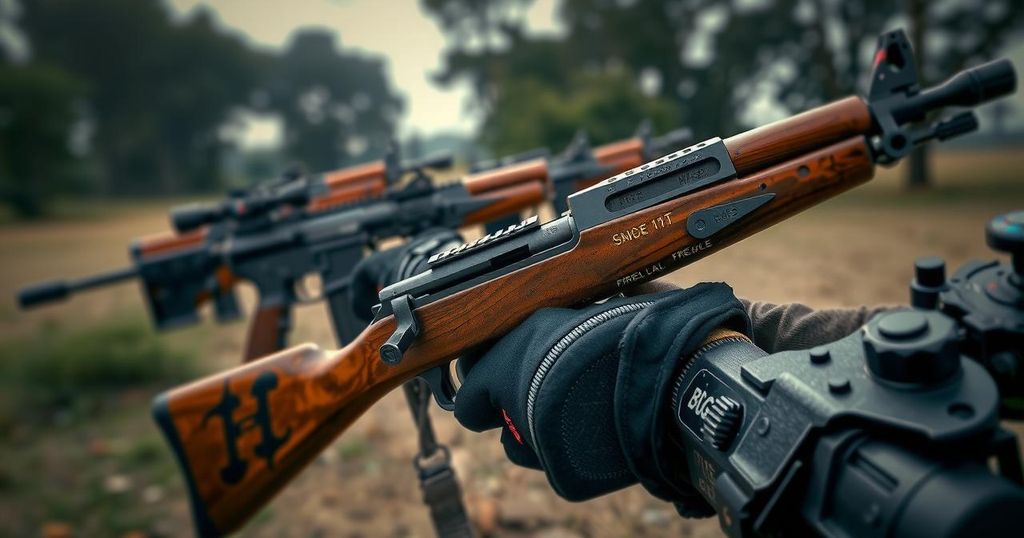Amnesty International reports that the Sudanese RSF is using UAE armoured carriers with French military technology, raising concerns about violations of the UN arms embargo. The findings underscore the necessity for nations to halt weapons transfers to conflicting parties in Sudan. The civil war has resulted in severe human rights abuses and a dire humanitarian situation, prompting calls for stricter enforcement of arms regulations by the global community.
A recent report by Amnesty International has disclosed that the Sudanese Rapid Support Forces (RSF) are employing armoured carriers manufactured in the United Arab Emirates (UAE) and integrated with French military technology amidst the ongoing civil conflict in Sudan. This development raises significant concerns regarding a possible infringement of the UN arms embargo on Darfur, prompting calls for an immediate cessation of weapon supplies from the international community to all factions involved in the conflict. The report, released on November 14, 2024, details that the UAE’s Edge Group is responsible for the manufacture of these armoured vehicles, which are equipped with the French-designed Galix reactive defence system, aimed at countering threats. Specifically, the report documents instances of the Sudanese army capturing and neutralizing such vehicles, known as Nimr Ajban armoured personnel carriers, in confrontations with the RSF. The existence of these military assets, especially within the Darfur region, poses a substantial risk of violating the UN arms embargo. This embargo is particularly crucial given Sudan’s troubled history with armed groups, including the RSF, which has historically contributed to regional instability and humanitarian crises. Agnès Callamard, Secretary-General of Amnesty International, has formally urged the French government to cease the provision of such military systems to the UAE, citing their deployment in Sudan as a breach of international arms control frameworks. In response, the UAE government has denied any claims regarding the provision of armaments or support to the RSF. The findings presented by Amnesty International highlight the pressing need for strict enforcement of existing arms embargoes to mitigate the escalating violence in Sudan, where the ongoing civil war, which ignited in April 2023, has resulted in the loss of over 20,000 lives and displaced close to 12 million individuals. The conflict, exacerbated by sophisticated weaponry, has led to severe human rights violations, including reports of ethnic cleansing and sexual violence. UN officials, including Under-Secretary-General Rosemary DiCarlo, continue to urge external actors to cease arms transfers, asserting that such actions only exacerbate violence and obstruct peace initiatives.
The conflict in Sudan has been marked by a complex interplay of armed factions, notably the Sudanese Armed Forces (SAF) and the Rapid Support Forces (RSF). The RSF has been implicated in numerous human rights violations, contributing to a humanitarian crisis that has displaced millions and resulted in widespread violence. The ongoing civil war, which began in April 2023, has drawn international scrutiny, particularly regarding the role of external actors in supplying arms to the conflicting parties. The presence of foreign-manufactured military equipment, such as those from the UAE incorporating French technology, raises urgent questions about compliance with international arms regulations, particularly the UN arms embargo on Sudan. This embargo aims to prevent further escalation of conflict and human rights violations in a country with a fraught history of armed conflict and militia activity. Advocacy groups like Amnesty International are crucial in tracking the flow of arms and calling for accountability among nations supplying weapons, as they strive to mitigate the cycle of violence that has dominated Sudan for years.
In summary, Amnesty International’s recent revelations regarding the use of UAE-manufactured armoured carriers by the RSF in Sudan emphasize a potential violation of the UN arms embargo. The report’s findings indicate the urgent need for international powers to reassess their military support to such factions. With the ongoing civil war leading to significant loss of life and widespread humanitarian crises, it is imperative for all countries to adhere to arms control regulations to foster peace and stability in the region.
Original Source: www.jurist.org






